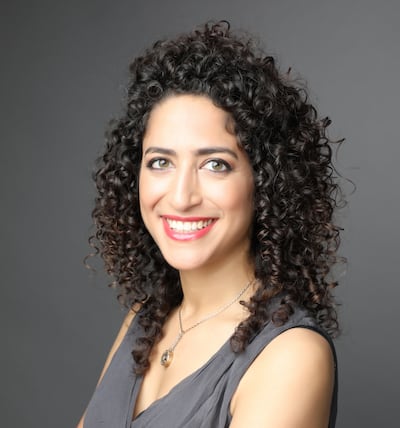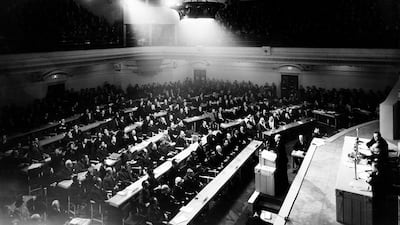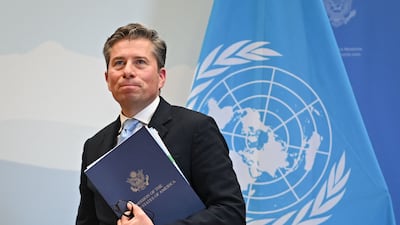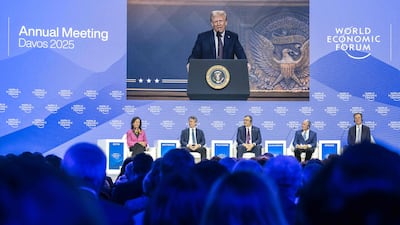
Hello from The National and welcome to the View from London – your weekly guide to the big stories from our London bureau
False stroke
There should be no more staunch pillar of the Western Alliance than Gen Sir Richard Barrons.
The former force commander has described for The National the “chaos and bewilderment” inside Nato headquarters as allies tried to come to terms with the White House’s increasingly unpredictable approach to Europe and collective security.
“We’re in uncharted territory for an alliance that has emphasised its unity since 1949,” the former head of the UK’s Joint Forces Command said on Tuesday. “We’re clearly having a different conversation now.”
US President Donald Trump, whose arrival in the Swiss resort of Davos for the World Economic Forum on Wednesday has been delayed by an electrical glitch on Air Force One, caused this state of affairs by wanting to take over Greenland, which is a territory of America’s Nato ally, Denmark.
Gen Barrons said the breach between America and Western Europe as a result carried profound risks if mishandled. “If the US were to take Greenland by force, that would be the end of Nato as we have known it. What would succeed it would be a very different relationship between the US and Europe.”
Gen Barrons told Thomas Harding that taking Greenland would amount to a “historic misjudgment”.
If there is one thing Mr Trump understands it is freehold compared to leasehold. You don’t grow up in the hardened world of New York real estate and not know the difference between landlord and tenant.
That’s what may well lie behind his shock decision to suddenly disapprove of the Chagos Islands deal. Under the arrangement, carefully negotiated by Keir Starmer and a year ago blessed by Trump, the Indian Ocean islands have been ceded to Mauritian sovereignty while expensively remaining leased as an unsinkable Indian Ocean airbase, used by the US.
Chris Blackhurst has written that the Chagos handover is now key to White House thinking on Greenland, which lies just off the North American continent. For reasons best known to him, Mr Trump has become fixated on the giant Arctic island. Is it because Greenland sits at the top of the world and is huge? Cover that with the stars and stripes and America is not only great again but greater in size as well.
But what type of deal will Mr Trump settle for? Property market models would suggest outright ownership not Chagos-style leaseholds are on the President's mind.
Policy quandary
Shamima Begum's challenge to the UK's ban on her return is about to come full circle with the collapse of Kurdish control in Syria.
Her fate is uncertain after the Syrian Democratic forces – a Kurdish group that controlled north-east Syria – on Tuesday withdrew from Al Hol, a camp for 68,000 Iraqis and Syrians displaced by conflict that also contains foreign fighters.
This followed clashes with the Syrian government around the camp. Ms Begum is detained at Al Roj, another camp further north. The SDF has signed a deal with the Syrian government to hand over control of the prisons and detention centres.
Rights groups say that the UK’s policy of revoking citizenship for the dozens of British nationals detained in these camps has left them and their children caught in the deadly crossfire.
The families of these detainees in the UK were in the dark and terrified at the “fragments” of information coming out of the camps.

“Today in north-east Syria, British children are in mortal danger, caught in the crossfire as a direct result of the UK Government’s negligent policy choice to strip the parents of citizenship and refuse to repatriate them,” said Maya Foa, chief executive of Reprieve, which works closely with the families of British detainees.
“This was always the likely consequence but ministers chose to bury their heads in the sand to avoid facing up to it."
The UK government could now be faced with further legal claims from the families of detainees back home should any of them be harmed or killed in the current clashes.
Any U-turn could deal a blow to the whole policy of stripping citizenship, which has rapidly widened its reach since Begum provided an opening for officials.
Focal point
To Nine Elms in south London, where a woman who was freed from Evin Prison as recently as last year has now started a 10-day hunger strike to raise the unfinished business of Mr Trump's backing for protests against the regime.
London resident Nasrin Roshan was on her third day of camping outside the US embassy. She told The National she plans to spend 10 days without eating.
Ms Roshan and two other demonstrators have put up a sign reading “Trump Smash Islamic Regime”, alongside US, UK and pre-revolutionary Iranian flags. “I want Trump to act now. He promised he would act if an Iranian was killed. 12,000 people have been killed now,” she said.
Mr Trump announced “help was on its way” at the height of the New Year protest. Yet thousands of Iranians have been killed in the past two weeks, with even the regime putting the death toll at 5,000.
Read more
The National produces newsletters across an array of subjects. You can sign up here. To receive The Editor's Briefing, our Editor-in-Chief's weekly newsletter that rounds up the top stories, sign up here.



